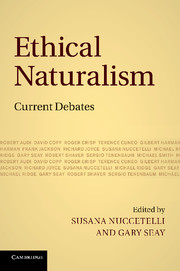Book contents
- Frontmatter
- Contents
- Contributors
- Introduction
- Chapter 1 Naturalism in moral philosophy
- Chapter 2 Normativity and reasons: five arguments from Parfit against normative naturalism
- Chapter 3 Naturalism: feel the width
- Chapter 4 On ethical naturalism and the philosophy of language
- Chapter 5 Metaethical pluralism: how both moral naturalism and moral skepticism may be permissible positions
- Chapter 6 Moral naturalism and categorical reasons
- Chapter 7 Does analytical moral naturalism rest on a mistake?
- Chapter 8 Supervenience and the nature of normativity
- Chapter 9 Can normativity be naturalized?
- Chapter 10 Ethical non-naturalism and experimental philosophy
- Chapter 11 Externalism, motivation, and moral knowledge
- Chapter 12 Naturalism, absolutism, relativism
- Bibliography
- Index
Chapter 9 - Can normativity be naturalized?
Published online by Cambridge University Press: 05 January 2012
- Frontmatter
- Contents
- Contributors
- Introduction
- Chapter 1 Naturalism in moral philosophy
- Chapter 2 Normativity and reasons: five arguments from Parfit against normative naturalism
- Chapter 3 Naturalism: feel the width
- Chapter 4 On ethical naturalism and the philosophy of language
- Chapter 5 Metaethical pluralism: how both moral naturalism and moral skepticism may be permissible positions
- Chapter 6 Moral naturalism and categorical reasons
- Chapter 7 Does analytical moral naturalism rest on a mistake?
- Chapter 8 Supervenience and the nature of normativity
- Chapter 9 Can normativity be naturalized?
- Chapter 10 Ethical non-naturalism and experimental philosophy
- Chapter 11 Externalism, motivation, and moral knowledge
- Chapter 12 Naturalism, absolutism, relativism
- Bibliography
- Index
Summary
Normativity is of great interest in ethics, aesthetics, epistemology, indeed in any discipline that attempts to account for certain standards by which we guide our thought and action. In the current intellectual climate, which is often dominated by naturalism and an emphasis on the scientific habit of mind, normativity presents a special challenge because normative statements – above all statements saying what we ought to do, or are justified in believing, or should consider ultimately good – do not seem to be ascriptions of natural properties to what they concern. If they are not, then they are not appraisable, or at least not fully so, using the methods of the sciences or even using those together with common-sense observations of the world.
Contemporary philosophy is witnessing an age of naturalization projects: in ethics, philosophy of mind, and even philosophy of mathematics and logic – two domains one might think would pose no challenge to naturalism, since they have neither the disadvantage of being mysteriously supernatural nor – since they are essential for any scientific work – that of competing with any particular scientific approach. It is important, then, that we explore the possibility of naturalizing the normative. In doing this we cannot consider all the plausible attempts to achieve such naturalization, but it is possible to examine some major representative ones. A main focus will be on the possibility of naturalizing reasons. The paper will raise serious doubts about whether they can be naturalized; but it will also show how some of the aims of well-conceived naturalization projects can be achieved: normative properties are in some cases accessible to perception and, even apart from that possibility, may be justifiedly ascribed to actions or other elements on the basis of clearly natural properties.
Keywords
- Type
- Chapter
- Information
- Ethical NaturalismCurrent Debates, pp. 169 - 193Publisher: Cambridge University PressPrint publication year: 2011
- 2
- Cited by



